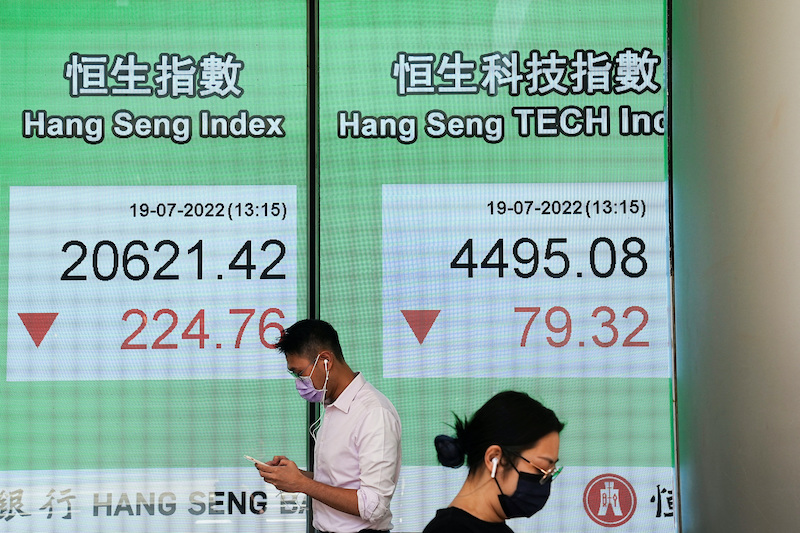Hong Kong stocks sank to 13-year lows on Monday and onshore yuan fell to its weakest level since 2007 after Xi Jinping’s newly unveiled leadership team heightened fears economic growth will be sacrificed for ideological policies.
The Hang Seng index plunged 6.4% and was down 1,030.43 points at 15,180.69 at the close of trading, touching levels last seen during the 2008-2009 global financial crisis.
Hong Kong-listed shares of tech giants Alibaba Group Holding and Tencent Holdings plunged 10% and 8% respectively, dragging the Hang Seng Tech Index down 7% to a record low.
Hong Kong-listed Chinese developers plummeted 9% to record lows. Both the property and tech sectors have been targeted for far greater regulation under Xi.
On the mainland, China’s bluechip CSI300 index lost 2.3%, while the Shanghai Composite Index dipped 2%, or 61.37 points, to 2,977.56. The Shenzhen Composite Index on China’s second exchange dropped 1.8%, or 34.58 points, to 1,932.34.
Stocks declines were more moderate for mainland markets which are less vulnerable to foreign selling and were bolstered by a surge in Chinese defence-related stocks as investors bet geopolitical tensions, particularly over Taiwan, will intensify.
ALSO SEE:
China’s New Leaders Unveiled in Beijing, Li Qiang No-2
Xi secured a precedent-breaking third leadership term on Sunday and introduced the new Politburo Standing Committee stacked with loyalists.
The appointments “show China moving from economic pragmatism to political ideology,” Ales Koutny, emerging markets portfolio manager at Janus Henderson Investors, said.
“The message here is clear: Covid Zero lockdowns, shared prosperity agenda and sectorial crackdowns are not going anywhere,” he said, adding that he believed these risks would limit China’s annual economic growth to just 2-3%.
China’s gross domestic product (GDP) rose 3.9% in the July-September quarter year-on-year, official data showed on Monday, rebounding at a faster-than-expected pace but that was not enough to cheer investors.
Offshore Yuan Near Record Low
Onshore yuan fell to its weakest level in 15 years. Offshore yuan, in which trade began from 2011, slipped to as low as 7.2790 per dollar, near its record low.
The cross-border China-Hong Kong Stock Connect saw a net outflow of roughly 9.2 billion yuan ($1.3 billion) on Monday morning.
“The short-term negative factor remains China’s extremely harsh Covid policies, which have hit foreign investors’ confidence toward China,” Yuan Yuwei, fund manager at hedge fund house Water Wisdom Asset Management, said.
Ravaged by China’s zero-Covid policy, which seeks to stamp out all outbreaks and has resulted in frequent lockdowns, sectors such as tourism, leisure as well as hotel and catering saw steep declines.
Common Prosperity
During the Communist Party’s 20th Congress, Xi reaffirmed his Common Prosperity drive, vowing to distribute income more fairly, and “standardise wealth accumulation mechanisms.”
He also emphasised national security, saying China should secure supply chains, sufficient grains and energy as well as work towards technological self-reliance.
An amendment to the Communist Party’s constitution enshrined “developing fighting spirit, strengthening fighting ability”, while a call to oppose and deter forces seeking independence for Taiwan was also included for the first time.
With investors dumping internet companies and property developers, some of those funds were re-directed into chipmakers, high-end equipment producers and defence stocks.
Minyue Liu, Greater China investment specialist at BNP Paribas Asset Management, said that her portfolio has reduced its exposure to stocks vulnerable to an increase geopolitical risks, favouring instead shares related to tech innovation, industrial upgrades and energy transition.
Some investors are less pessimistic, arguing China’s new leadership team is well aware of the importance of economic growth.
“I think that there’s growing consensus among policymakers, that one priority should be to make the economic cake bigger, through quality growth,” said Mark Dong, general manager of Minority Asset Management (Hong Kong).
- Reuters with addtional editing by Jim Pollard
NOTE: The headline on this report was amended and details from the close of trading added on October 24, 2022.
ALSO SEE:
Anti-Xi Protest Spreads in China and Worldwide – CNN
Xi Cements His Domination in China at Party Congress
China’s Next Premier Oversaw the Shanghai Lockdown
China’s No-2 Li Keqiang Axed From Politburo, Central Committee
China’s Central Bank Chief Seen Retiring As Reformers Axed
























